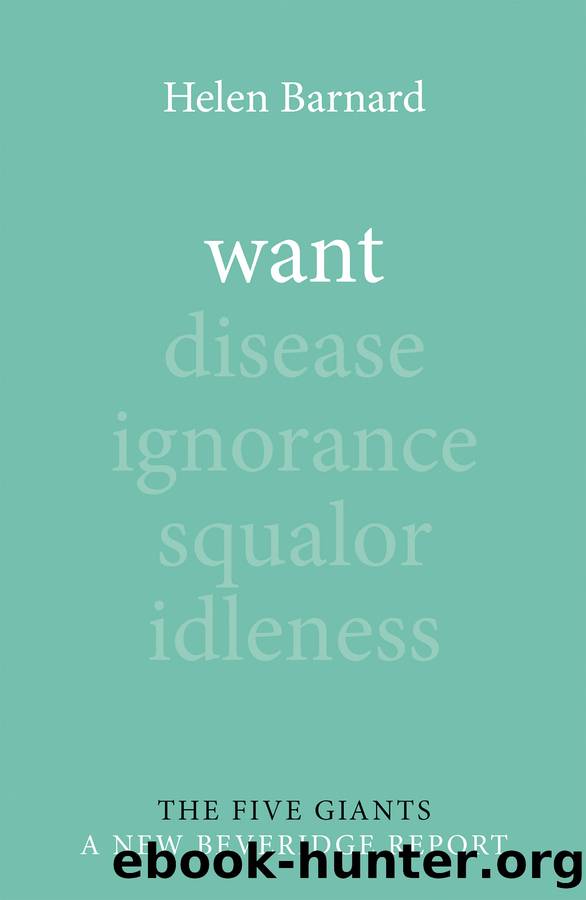Want by Helen Barnard

Author:Helen Barnard
Language: eng
Format: epub
Publisher: Agenda Publishing
Published: 2022-06-15T00:00:00+00:00
9
Public services for the digital age
So far, Iâve been talking about the type and level of financial support thatâs on offer in our social security system. But when you talk to people living in poverty, itâs clear that it is equally important to consider non-financial support and how people are treated when they access both financial and non-financial services. An abstract view of poverty tends to focus purely on amounts of money and modelling behavioural responses to taxes, benefits, the labour market and so on. But the experience of poverty is as much about feeling powerless, dismissed and despised as it is about material hardship.
Public services â social security, employment support and health, social and local authority services â can build people up or knock them down. They can be a forum within which people are treated with dignity, listened to and respected, and where they are empowered to change their circumstances and realize their ambitions. Or they can be a place where people are made to feel they are problems to be fixed and are further disempowered and infantilized.
Before Beveridge and the reforms of the 1940s onwards, our public services were made up of a patchwork of voluntary and mutual organizations, Church provision and some limited local government funding and services. The Elizabethan Poor Law, introduced at the end of the sixteenth century, provided a legal underpinning and baked in the distinction between the deserving and undeserving poor. It ensured that the evolving system included detailed assessments and harsh conditions to prevent those classified as undeserving from receiving help that might encourage idleness and immorality. There were basically three roles available within this system: wise benefactor, passive supplicant and roguish malefactor. There were some positives to this system, particularly its localized nature and close involvement of what we would now call grassroots voluntary and community sector organizations. However, it failed to protect many people from hardship or provide the help that would enable them to build a better life for themselves. It was also wholly unsuited to the new industrial age.
The development of the industrial economy transformed all parts of society. Workers were collected in large numbers in cities, working in factories and on production lines and living in close proximity to the elites and middle classes. The growth of city slums gave rise to fears of disease spreading not only through the new working classes but also to the middle classes. The appalling living and working conditions were also thought to breed immorality and to weaken the strength of soldiers needed to fight first the Boer War and then the First and Second World Wars. New thinking also emerged about the causes of these ills, particularly unemployment. In Beveridgeâs first report on employment in 1909 he argued that unemployment was not only caused by individual laziness but was generated by the wider structures of the new industrial economy. It was a problem that would not be solved by local, individually focused solutions. It was an industrial problem that required an industrial solution.
Download
This site does not store any files on its server. We only index and link to content provided by other sites. Please contact the content providers to delete copyright contents if any and email us, we'll remove relevant links or contents immediately.
The Secret History by Donna Tartt(19092)
The Social Justice Warrior Handbook by Lisa De Pasquale(12190)
Thirteen Reasons Why by Jay Asher(8912)
This Is How You Lose Her by Junot Diaz(6888)
Weapons of Math Destruction by Cathy O'Neil(6281)
Zero to One by Peter Thiel(5802)
Beartown by Fredrik Backman(5756)
The Myth of the Strong Leader by Archie Brown(5509)
The Fire Next Time by James Baldwin(5447)
How Democracies Die by Steven Levitsky & Daniel Ziblatt(5219)
Promise Me, Dad by Joe Biden(5154)
Stone's Rules by Roger Stone(5088)
A Higher Loyalty: Truth, Lies, and Leadership by James Comey(4964)
100 Deadly Skills by Clint Emerson(4926)
Rise and Kill First by Ronen Bergman(4790)
Secrecy World by Jake Bernstein(4753)
The David Icke Guide to the Global Conspiracy (and how to end it) by David Icke(4720)
The Farm by Tom Rob Smith(4514)
The Doomsday Machine by Daniel Ellsberg(4490)
